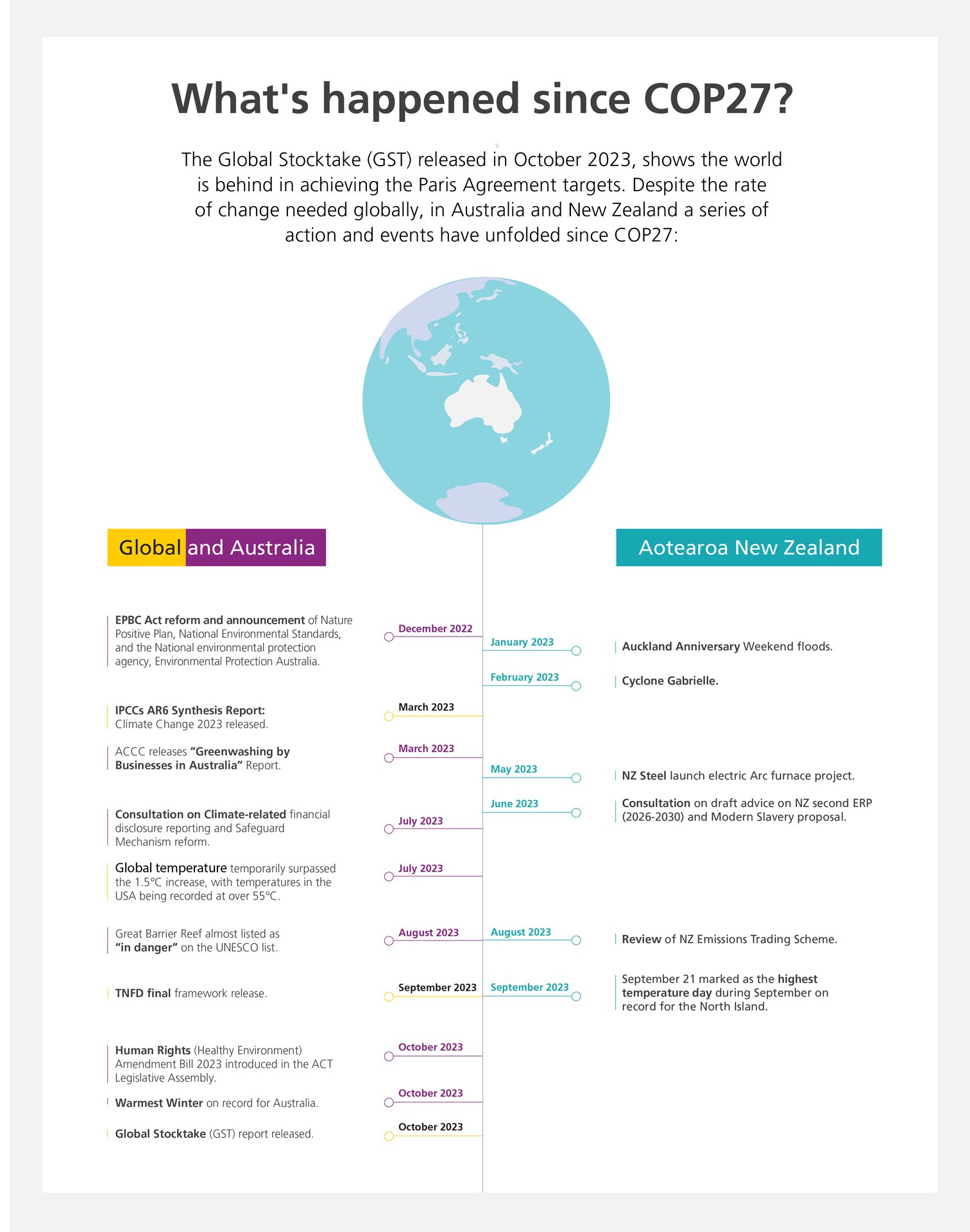Over the past year we’ve witnessed an undeniable surge in wildfires, floods, storms, and heatwaves driven by climate change - impacting lives globally. An alarming testament to this escalation, the summer of 2023 has set a record as the hottest since 1880.
With the Conference of Parties (COP28) starting on November 30, it’s clear we need global collaboration to tackle climate change, the critical challenge of our era. In enabling the collaboration, CEO Amelia Linzey and Industrial Group Director Jimmy Walsh are attending the global climate change conference as part of the New Zealand business delegation.
Attending COP28 will be a chance to support the delegation, strengthen partnerships with the global climate action community and fellow attendees, and highlight our shared commitment to meaningful environmental and social outcomes for Asia Pacific. This is especially important considering the official bid by Australia and the Pacific Islands to co-host COP31 in 2026.
This year’s COP, held in the United Arab Emirates, will see the conclusion of the first-ever Global Stocktake (GST). Results are expected to show the world is behind on meeting Paris Agreement targets, making the 1.5 degrees Celsius limit on global warming a tough ask without ongoing and unified efforts to reduce emissions.
The topic of the Loss and Damage Fund will be negotiated in depth, including the contentious issue of how it will be distributed and managed. The Fund is intended to assist and compensate vulnerable and developing countries affected by natural disasters caused by climate change.
What is COP?
The Conference of Parties is a critical, global climate conference which is held annually in various member countries. It was born of the United Nations Framework Convention on Climate Change (UNFCCC) held 30 years ago during the Rio Summit. The conference is a meeting place for member countries, private industry, NGOs, governments, media, and civil society to discuss and determine the World’s climate ambitions, responsibilities, and evaluate measures to prepare for and respond to impacts of climate change.
COP is not only globally important, but important for our clients and the communities we work with here at Beca. The themes of this year’s COP draw on key focus areas for Beca, and many of our clients in Asia Pacific are at the forefront of climate change impacts.
What has happened since COP27?

What outcomes can we expect from COP28?
We need to transition from pledges to tangible actions and accountability, harnessing a blend of solutions. This includes mitigation, adaptation, renewable energy, energy efficiency, finance, and technology.
While COP28 is not a silver bullet for tackling climate change issues, it provides an essential platform for significant decision-making and commitment.
We expect the outcomes from COP28 to include some key elements:
Clear and decisive action as a result of the Global Stocktake
According to the Global Stocktake (GST), the world is not on track to meet the Paris Agreement targets. However, some believe that COP28 will push delegates to get back on track by developing a roadmap for urgent climate action. In identifying the gaps highlighted in the GST, we can address the gaps and develop actions to meet the targets.
The GST should assess nations’ climate plans, prioritise people-centric transitions, stress ambitious mitigation targets, examine adaptation and resilience efforts, and track financial support for mitigation, capacity-building and technology access in developing countries.
Progress on Loss and Damage Fund from discussion to implementation
The details of the Loss and Damage Fund are to be discussed during COP28 this year. While the required investment will undoubtedly be sizeable, establishing a means to access funds will surely benefit millions of people in vulnerable and developing nations, such as Chad and Pacific Island nations including Kiribati, and Tuvalu. These nations are already suffering the worst of climate change impacts like flooding, storms, cyclones, high temperatures, and sea level rise.
Financial support for climate mitigation in developing countries
The Loss and Damage Fund must be supplemented by developed countries providing financial aid for renewable energy, resilient infrastructure, and capacity building in developing nations. COP’s focus on capital deployment should target swift emissions reduction, inclusive transitions and adaptation, considering natural systems, Indigenous culture, communities, and livelihoods.
A global framework for adaptation
The prospective Global Goal on Adaptation (GGA) framework is key for setting specific resilience-building and climate adaption targets for countries. This framework should focus on boosting and assessing adaptation initiatives and associated support.
Support for the ramp-up of renewables
Renewable energy can supply 90% of global demand by 2050, requiring commitment from major funders and cross-sector partnerships. Currently, renewables provide 30% of global electricity, led by hydropower, solar and wind. In New Zealand, 80-85% of electricity comes from clean resources, ranking among the world’s highest. Ensuring we have resilient (affordable, reliable, accessible) means to transmit this energy will be an essential element of this ramp-up.
Ambitious and concrete commitments
Countries should unite to boost their climate targets or Nationally Determined Contributions, by committing to larger emissions cuts and a shift to a low-carbon economy. Energy efficiency measures, including building codes and frameworks, should also have specific time-bound targets within robust regulatory frameworks.
Nature-based solutions
Increased recognition and support for nature-based solutions like forest conservation and sustainable land management to mitigate emissions and bolster resilience, particularly by involving Indigenous communities and embracing their long-standing values and practices.
"Just transition" to a low-carbon future, for everyone
The "just transition" approach aims for a fair, inclusive shift to a low-carbon economy, focusing on the wellbeing of affected workers and communities. This involves retraining, redeployment, green job creation, and sufficient social protection. Implementing transition metrics will help monitor progress and hold agencies accountable, leading to an equitable, sustainable, greener economy that includes everyone.
There is certainly a lot to ponder on as the world looks ahead to COP next week, I’ll leave you here with a question:
What do you think would be a successful outcome from COP28? Would it be concrete climate commitments, financial support, collaboration across countries, or something else entirely?
While there is no quick and easy, one-size-fits-all answer to the myriad challenges and impacts of climate change, the practical solutions we need will most certainly rely on engineering, innovation, collaboration, and partnership.
Together, now more than ever, we must hold ourselves and each other accountable.
Find out more about our work to deliver a more sustainable, resilient future alongside our clients and communities, or get in touch.
Lesliey Golds
Climate Change and Sustainability Analyst
 New Zealand
New Zealand
 Australia
Australia
 Singapore
Singapore